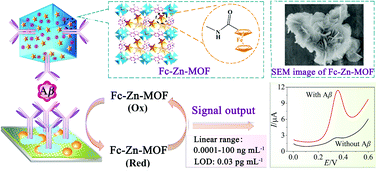Ferrocene covalently confined in porous MOF as signal tag for highly sensitive electrochemical immunoassay of amyloid-β†
Abstract
Here a new type of ferrocene confined in a metal–organic framework (Fc-Zn-MOF) as an electrochemical signal tag has been synthesized and applied in an immunosensor for highly sensitive amyloid-β (Aβ, as a model protein) detection. In the present work, an electrochemically active molecule of Fc was covalently bonded in a Zn-MOF via postsynthetic modification to obtain a flower-like Fc-Zn-MOF, in which the high-content Fc signal units were periodically arranged in a well-defined porous structure, showing enhanced electrochemical activity. As noticed, Fc molecules are chemically anchored on the Zn-MOF, which avoids leakage of signal molecules, protects those electrochemical activities from potential damage and exhibits good stability. The Fc-Zn-MOF signal tag was further explored in constructing an electrochemical immunosensor for Aβ detection, with a linear range from 0.0001 to 100 ng mL−1 and a detection limit of 0.03 pg mL−1, showing improved analytical performance. This work presents an example of an Fc-MOF as a signal tag for Aβ detection, which would encourage atypical research lines for MOFs in bioassays where the introduction of ordered structures promises new opportunities.



 Please wait while we load your content...
Please wait while we load your content...